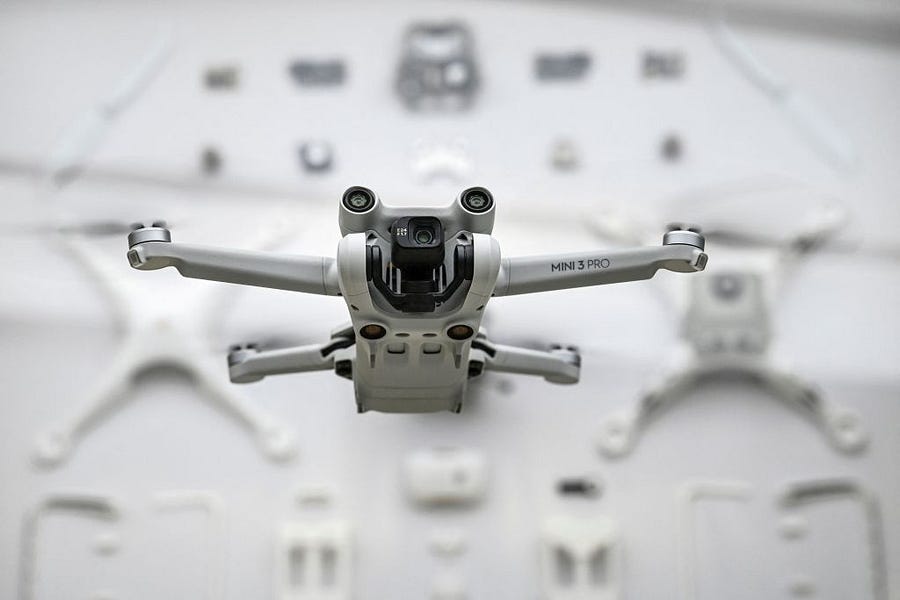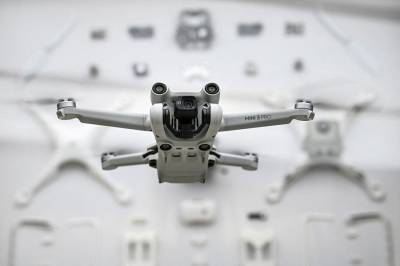Hello and happy Thursday!
What if I told you that a Chinese technology company known to spy for the Chinese government is using local law enforcement to lobby Congress and to derail legislation that would improve American data security and reduce foreign espionage? Well, this is exactly what China’s DJI drone company is doing and it needs to stop.
We’ve talked about DJI before, but as a quick refresher the company is a global juggernaut. It owns 90 percent of the consumer drone market and 70 percent of the enterprise/industrial drone market. DJI drones are cool. They’re easy to fly, can be quite small, and are typically more affordable than the offerings from competitors. There’s just one problem: As a Chinese company, all the data collected by DJI must be made available to the Chinese Communist Party (CCP), which can then add this information to its growing data stores on American citizens, critical infrastructure, and other priority espionage targets. Importantly, it's not just the data collected by the drone itself that’s up for grabs, but also all the data collected by the mobile application DJI customers use to control their drone and to manage their DJI account. Like many other mobile applications, this includes a user’s contacts, photos, GPS location, and online activities. DJI, of course, denies all this.
But the Department of Homeland Security (DHS) has issued a warning about Chinese-made drones (though it didn’t name DJI, specifically):
“The United States government has strong concerns about any technology product that takes American data into the territory of an authoritarian state that permits its intelligence services to have unfettered access to that data or otherwise abuses that access. … Those concerns apply with equal force to certain Chinese-made UAS-connected devices capable of collecting and transferring potentially revealing data about their operations and the individuals and entities operating them, as China imposes unusually stringent obligations on its citizens to support national intelligence activities.”
The Department of Defense has also banned the acquisition of DJI drones, with limited exceptions for research, publicly stating, “The Department of Defense (DOD) position is that systems produced by Da Jiang Innovations (DJI) pose potential threats to national security.” Considering these concerns and mounting evidence of DJI’s complicity in helping the CCP commit gross human rights violations in surveilling Muslims in Xinjiang, DJI has also been added to the U.S. Entities List, making it illegal for American companies to export technology or materials to the drone maker.
But, while DHS has issued a warning, DOD isn’t buying these drones, and American companies cannot help DJI, the company is still operating in the United States and remains popular with other federal departments and agencies, like the FBI, which says the drones are just too important and too cheap to lose. Thus, Congress has drafted the American Security Drone Act (ASDA) to close this vulnerability.
The ASDA bans all federal procurement of Chinese-made drones and “other unmanned aircraft systems,” bringing the entire federal government into coherent alignment with the security concerns expressed by DHS and the DOD. I personally believe we can and should go even further by banning DJI from doing any business in the United States (because I think individual and local data security is as important as federal data security) but I can tilt at that windmill on a different day. Suffice to say, I believe the ASDA is common sense and would go a long way in shutting down a completely unnecessary and preventable national security risk. As to agency claims that the world will end if they can’t buy DJI drones: Bunk! There are plenty of trusted alternatives that are just as good (if not better), and I don’t care how much money these organizations are saving if it requires the sacrifice of our data and security.
But it’s not just the feds who like DJI drones: Local police departments love these devices, too. Cops use drones to document evidence, to look for criminals in hard-to-reach environments, and to maintain situational awareness in “active” crime scenes like a bank robbery or hostage-taking. It’s no exaggeration to say that DJI has become the go-to off-the-shelf solution for local police departments looking to up their tech game, with 90 percent of U.S. public safety agencies who have drones using DJI. And this gives the company a compelling advocate.
DJI spent $1 million in lobbying last year and another $700,000 this year. Over the last several months, it's been flying in police officers and other first-responders from local municipalities to meet with congressional offices and to lobby against the ASDA. I’ve engaged with some folks in these meetings and here’s how it works.
It begins when a lobbying firm reaches out to an office and says they’d like to bring a group of police officers to chat about “the evolving importance of drone usage in law enforcement.” This kind of meeting is totally normal for Hill staffers and DJI is never mentioned.
When the meeting happens, it typically begins with a cop outlining all the ways drones are transforming local law enforcement and how these devices are keeping individuals and communities safe. About halfway through the meeting, however, a DJI representative speaks up and makes four points: (1) Congress should be “agnostic” on where drones are made; (2) DJI is safe and secure because users must allow DJI access to their information; (3) the ASDA does not understand the benefits of DJI drones and threatens to hurt local communities, and (4) DJI drones offer cash-strapped police departments the best bang for their buck. Driving the point home, DJI makes sure the congressional staffer understands that more than 80 percent of the more than 800 members of the Law Enforcement Drone Association (LEDA) are “using DJI or other Chinese drone manufacturer.”
Let me quickly dispense with the company’s four arguments. First, Congress cannot be “agnostic” on drones because Chinese law and the CCP’s tendency to use domestic companies as extensions of the state requires us to mitigate these threats. Second, most American users don’t understand that, in agreeing to give DJI access to their data, they’re agreeing to give Beijing access as well. Also, the fact that a user has willingly granted access to this data doesn’t make it a less dangerous threat, only a self-inflicted one. Third, the ASDA understands the threat of DJI drones and works to protect local communities. Finally, the LEDA should know better and the fact that 80 percent of its members are using Chinese-made drones is an argument for action, not inaction. But let’s get back to the role of local cops in this discussion—that's jacked-up and I have some thoughts.
First, I assume local departments and cops don’t know they're being used by the Chinese government. I totally understand how “Sgt. Murphy” from Oatmeal, Texas, isn’t keeping up with the latest and greatest on the geopolitical tensions between Washington and Beijing. All he knows is that these drones are helpful and that they fit within his meager budget. What’s especially crazy about getting Ol’ Murph wrapped up in all of this is that the ASDA will have zero effect on his department. This legislation is focused only on the federal government, and DJI is just using state officials as sympathetic pawns.
But this raises several other related questions. Who’s paying for these trips? I highly doubt local cops love their DJI drones enough to take vacation time and to travel to D.C. on their own dime. Instead, I suspect a lobbying firm or maybe the LEDA is footing the bill. A quick review of the association’s website shows that DJI and at least one other Chinese drone maker are LEDA sponsors, which would make the organization a convenient way of facilitating these trips. Relatedly, are these cops acting in an official capacity? Are they being paid or being given some other form of remuneration? Do their bosses back home know their employees are lobbying Congress on behalf of a foreign company, especially one financed by the CCP? Are they okay with this?
There’s also an important context to all of this. While I have a well-earned reputation as a China “hawk,” I’m not making these concerns up out of thin air. In July, the Office of the Director of National Intelligence’s National Counterintelligence and Security Center issued a memo with the following warning:
Some of the goals of PRC influence operations in the United States are to expand support for PRC interests among state and local leaders and to use these relationships to pressure Washington for policies friendlier to Beijing. The PRC understands U.S. state and local leaders enjoy a degree of independence from Washington and may seek to use them as proxies to advocate for national U.S. policies Beijing desires, including improved U.S. economic cooperation with China, and reduced U.S. criticism of China’s policies towards Taiwan, Tibetans, Uyghurs, pro-democracy activists, and others...
Leaders at the U.S. state, local, tribal, and territorial levels risk being manipulated to support hidden PRC agendas. PRC influence operations can be deceptive and coercive, with seemingly benign business opportunities or people-to-people exchanges sometimes masking PRC political agendas. Financial incentives may be used to hook U.S. state and local leaders, given their focus on local economic issues. In some cases, the PRC or its proxies may press state and local leaders to take actions that align with their local needs, but also advance PRC agendas, sometimes over national U.S. interests. By their nature, these efforts can have a corrosive effect on targeted societies. They can also threaten the integrity of the U.S. policy-making process and interfere in how U.S. civil, economic, and political life functions.
Put simply: DJI’s manipulation and use of local and state law enforcement is part of a broader political influence campaign inside of and targeting the United States. And, while regional officials can be forgiven for not being wise to the con, the federal government needs to shut it down and help local and state leaders become more sophisticated.
But, even with Beijing’s dirty tricks, the ASDA just makes sense and it’s time for Congress to pass this bill. On two separate occasions, the ASDA language has been added to the National Defense Authorization Act (NDAA)—one the few bills that is almost always guaranteed to pass every year—with bipartisan support, only to be stripped from the bill when House and Senate members met in conference to finish the legislation. This is inexcusable, and it should not happen again.
Action by the Senate’s Homeland Security and Governmental Affairs Committee (HSGAC), under whose jurisdiction this legislation largely falls, and whose leadership should take special responsibility for seeing this legislation is passed, is critical. HSGAC Chairman Sen. Gary Peters has publicly stated that, “[federal agencies] should prevent funding from being used on drones manufactured by companies that pose a security risk,” going on to say, “This is essential to advancing our national security objectives and protecting our country’s infrastructure.” The committee’s ranking member, Sen. Rob Portman, has been even more clear, lamenting in a recent hearing, “I can’t believe we have to write legislation to force U.S. agencies to ban the use of Chinese-made drones, particularly where the servers are in China, where the Chinese government is a part owner and a supporter of this particular company.”
I couldn’t agree more with each senator, and I hope Republicans and Democrats will finally work together to pass the ASDA and to confront China’s technological espionage and cynical manipulation of local law enforcement. Look, China is doing what China does and at some point, we must stop complaining about them playing the game and simply stop letting them win.
That’s it for this edition of The Current. Be sure to comment on this post and to share this newsletter with your family, friends, and followers. You can also follow me on Twitter (@KlonKitchen). Thanks for taking the time and I’ll see you next week!






Please note that we at The Dispatch hold ourselves, our work, and our commenters to a higher standard than other places on the internet. We welcome comments that foster genuine debate or discussion—including comments critical of us or our work—but responses that include ad hominem attacks on fellow Dispatch members or are intended to stoke fear and anger may be moderated.
With your membership, you only have the ability to comment on The Morning Dispatch articles. Consider upgrading to join the conversation everywhere.